Link building is one of the most crucial aspects of search engine optimization (SEO). It refers to the process of acquiring hyperlinks from other websites to your own. These backlinks serve as signals of trust, authority, and relevance in the eyes of search engines like Google, Bing, and Yahoo. The more high-quality links you have pointing to your website, the more likely it is that search engines will consider your content valuable and rank it higher in search engine results pages (SERPs).
According to Ahrefs, there is a strong correlation between the number of referring domains and the volume of organic traffic a website receives. In simpler terms, if more reputable websites link to yours, your chances of getting more visibility on Google significantly increase.
Table Of Contents
Quick Summary (Unique & Value-Driven)
Link building is the practice of acquiring backlinks—hyperlinks from other websites—to enhance your site’s credibility and search engine rankings.
It directly impacts your site’s Domain Authority (DA), organic visibility, referral traffic, and brand trust in Google’s eyes.
The goal isn’t just ranking—it’s building long-term authority and creating strategic digital relationships.
Proven strategies include guest posting, competitor mention outreach, resource page placements, Skyscraper technique, HARO pitches, and podcast guesting.
Tools like Ahrefs, Semrush, Moz, Respona, and Brand24 are critical for finding opportunities, analyzing backlinks, and automating outreach.
A successful link building campaign is rooted in value-driven content, relationship-building, and white-hat SEO practices—not shortcuts.
The most sustainable backlinks come from content quality, networking, and personalized outreach—not quantity.
What is Link Building in SEO?
Link building is the practice of acquiring hyperlinks from other websites to your own. These links—often called backlinks—act as a vote of confidence in the eyes of search engines like Google, helping your site rank higher in search engine results pages (SERPs).
Each quality backlink you earn tells Google that your content is trustworthy, credible, and authoritative—especially if those links come from high-authority domains like Wikipedia, TechCrunch, or BBC.
🔗 Google-recognized entities used here:
→ Backlink, Google Search, PageRank, Domain Authority, Search Engine Results Page (SERP)
Why is Link Building Important?
Backlinks are one of Google’s top three ranking factors, alongside content and RankBrain. Here’s why you should build them:
1. Boost Search Rankings
The more quality referring domains you have pointing to your site, the more likely you are to climb the rankings. According to a study by Ahrefs, there’s a direct correlation between the number of referring domains and organic traffic.
2. Drive Referral Traffic
A well-placed link on a blog, resource page, or news article doesn’t just help SEO—it drives qualified visitors to your site.
3. Improve Site Discoverability
Search engines use web crawlers (like Googlebot) to navigate the internet through links. A strong internal and external link structure helps your site get discovered and indexed faster.
4. Build Authority & Trust (E-E-A-T)
Getting backlinks from relevant, credible sites boosts your Experience, Expertise, Authoritativeness, and Trustworthiness—Google’s E-E-A-T principles.
🔗 Entities: Ahrefs, Googlebot, E-E-A-T, Crawling, Referring domain, Indexing
The Purpose Behind Link Building
The ultimate goal of link building is to increase the credibility and visibility of your website in the digital space. But beyond SEO, it’s about creating relationships, expanding your network, and adding value to your audience. The process involves identifying relevant link opportunities, creating compelling content, and engaging in meaningful outreach.
10 Proven Link Building Strategies
1. Guest Posting
Guest posting is one of the most efficient and scalable link building strategies. By contributing content to relevant blogs, you can include backlinks within the article or author bio. Look for blogs with “Write for Us” pages or pitch custom topics using tools like Respona and Semrush’s Keyword Gap feature.
Tactics:
Use advanced Google search operators:
intitle:"write for us" [niche]Pitch content gaps after successful collaborations
Reference partner sites to build reciprocal links
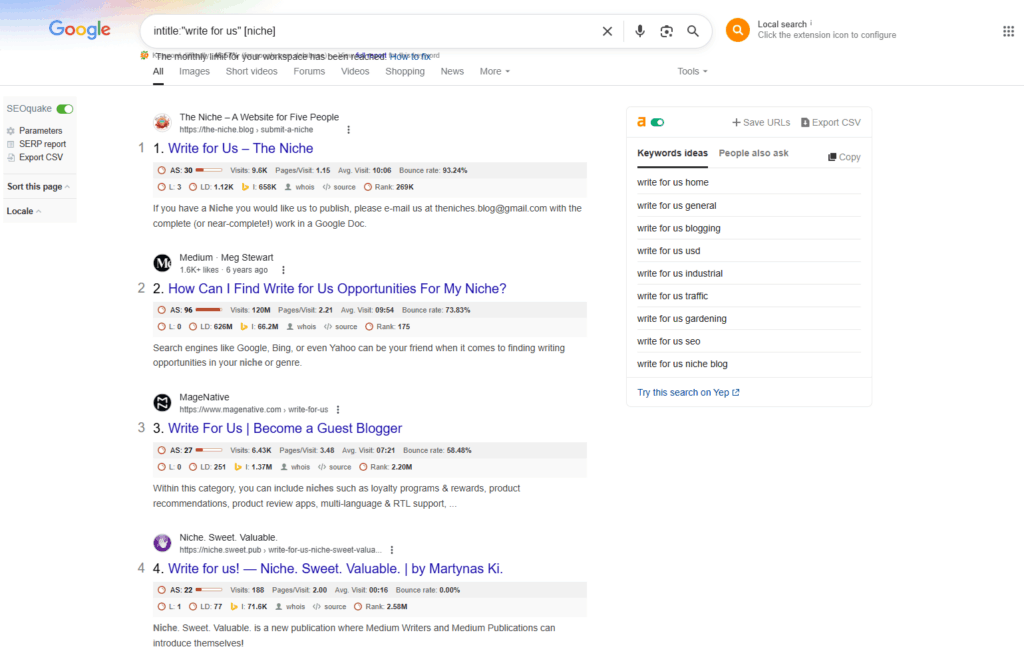
2. Competitor Mentions
Identify blogs and articles that mention your competitors but not you. Offer value, such as a free trial or an expert quote, and ask for inclusion.
Discovery Tips:
Use Google:
inurl:blog -site:competitor.com intext:"competitor"Use backlink monitoring tools like Ahrefs or Semrush
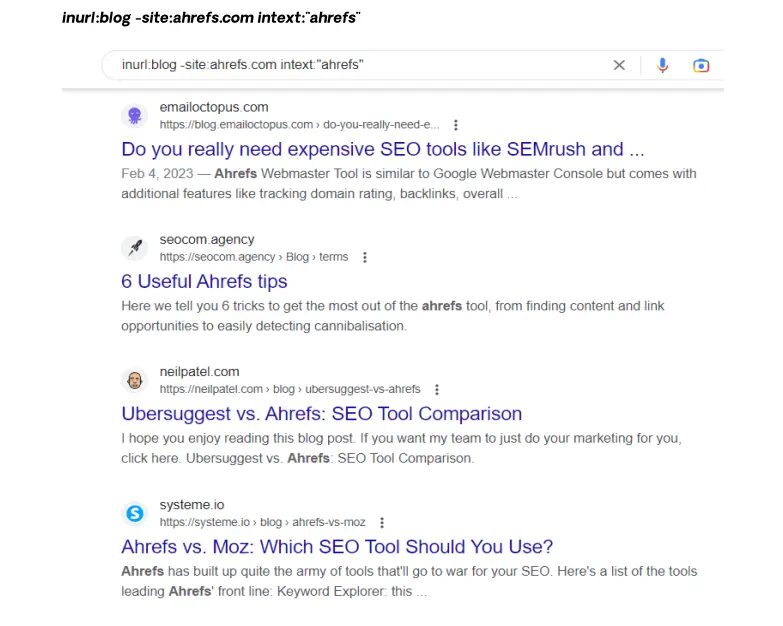
3. Resource Page Link Building
Reach out to sites that maintain lists of useful resources. These pages are great for placing contextual, evergreen backlinks.
Search Strings:
intitle:"best" + keyword + intitle:"resources"Use Respona’s built-in resource page campaign template
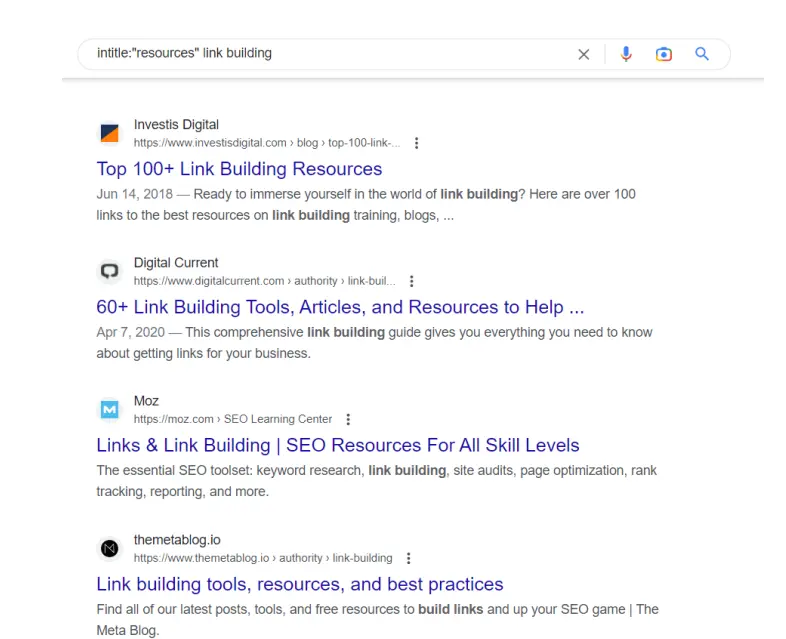
4. Skyscraper Technique
Find popular content already ranking for your target keyword, create something better, and pitch it to websites linking to the original.
Tools:Ahrefs Site Explorer
Respona’s backlink scraper
5. Link Insertion (Anchor Text Strategy)
Suggest adding your link into an existing article that briefly mentions your topic but doesn’t expand on it.
Example:Find articles mentioning “content distribution” but not in the title
Offer your in-depth guide as an enhancement
6. Unlinked Mentions
Track mentions of your brand that don’t include a hyperlink and request attribution.
Tools:Brand24
Ahrefs Content Explorer with “highlight unlinked” filter
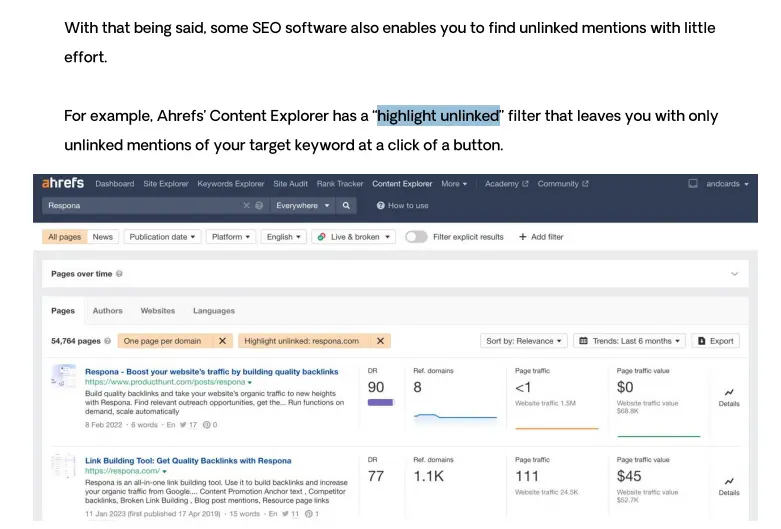
7. Link Reclamation
Recover lost links caused by page removals or content updates.
Execution:
Use Semrush Backlink Analytics > Filter by “Lost Links”
Reach out and request re-linking
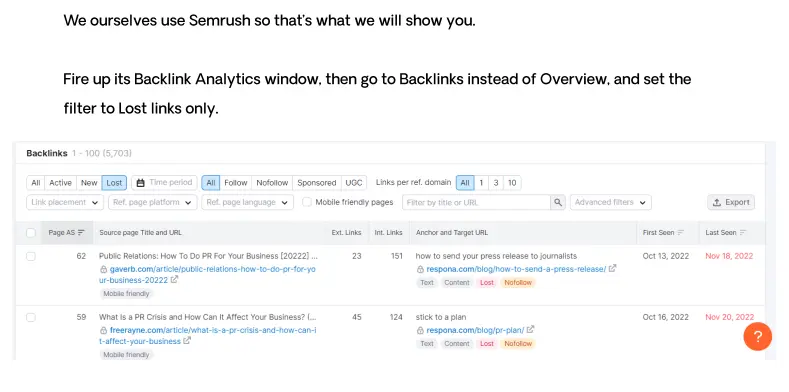
8. HARO (Help A Reporter Out)
Respond to journalist queries in HARO newsletters to earn high-authority backlinks.
Pro Tips:
Sign up at HelpAReporter.com
Respond quickly with concise, expert insights
9. Podcast Outreach
Appear as a guest on niche podcasts. These often include backlinks in show notes and provide brand exposure.
Tool:
ListenNotes (for podcast discovery)
10. Infographic Outreach (Guestographics)
Create and share valuable infographics with blogs covering similar topics.
Discovery:
Use
intitle:"[keyword]" inurl:blogto find articles lacking visual content
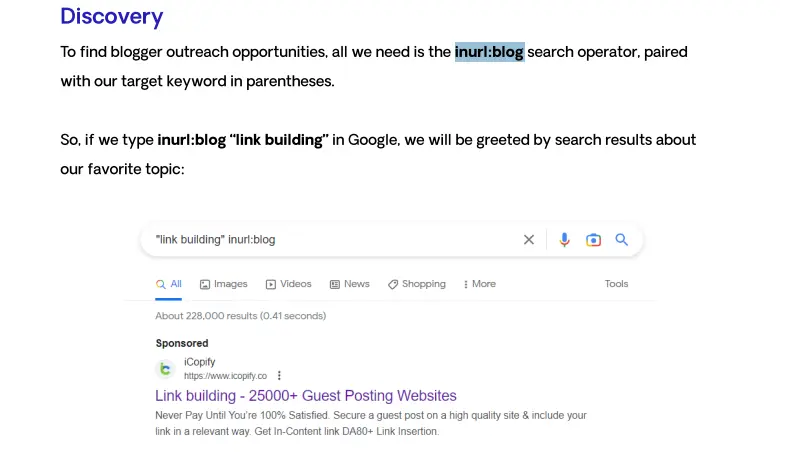
Tools for Link Building Success
Ahrefs: Backlink analysis, content explorer, keyword research
Semrush: Keyword gap, backlink analytics, lost link filter
Respona: Outreach automation, contact discovery
Moz: Domain authority tracking, spam score
Brand24: Brand monitoring for unlinked mentions
Google Search Console: Track link performance and indexing
Final Thoughts
Link building is more than just a ranking factor; it’s the backbone of sustainable SEO and digital brand building. Effective link building combines smart strategy, valuable content, and genuine relationship-building. Whether you’re using advanced techniques like the Skyscraper Method or simply reclaiming lost backlinks, consistency and relevance are key.
To truly dominate your niche, focus on building meaningful connections and delivering content that deserves to be linked to.
Frequently Asked Questions (FAQs)
1. How do I know if a backlink is high-quality?
A high-quality backlink typically comes from a reputable, authoritative website that is relevant to your niche. Look for backlinks that are editorially placed within content, use natural anchor text, and come from pages with strong domain metrics (like high Domain Authority or Page Authority).
2. What is the difference between a backlink and a referring domain?
A backlink is a single link from one webpage to another, while a referring domain is the entire domain or website that hosts one or more backlinks to your site. Multiple backlinks from the same domain count as one referring domain.
3. Can low-quality backlinks hurt my SEO?
Yes, low-quality or spammy backlinks can negatively impact your SEO. Google may penalize websites with unnatural or manipulative link profiles. Regular backlink audits using tools like Ahrefs or Semrush can help identify and disavow harmful links.
4. How often should I perform backlink analysis?
Backlink analysis should be a recurring activity—monthly for active SEO campaigns or at least quarterly. Regular checks help track progress, find new opportunities, detect lost links, and avoid toxic backlinks.
5. What is anchor text and why does it matter?
Anchor text is the clickable text in a hyperlink. It plays a key role in helping search engines understand the context of the linked page. Balanced and relevant anchor text improves SEO, while over-optimized or irrelevant anchors can raise red flags.
Need Help With Link Building?
Have questions about your SEO strategy or want to analyze your backlink profile with expert insights? Let’s collaborate to grow your search visibility with high-authority backlinks.
Or email us at sales@citationbuilderpro.com — we respond within 24 hours!
How useful was this post?
Average rating 3 / 5. Votes: 2
No votes so far! Be the first to rate this post.

With 15+ years of experience in custom SaaS development, product, management focused on digital media and multi-platform customer experience. Over the last 10 years, I have established 4 successful businesses and managed 100+ people between the four businesses.




